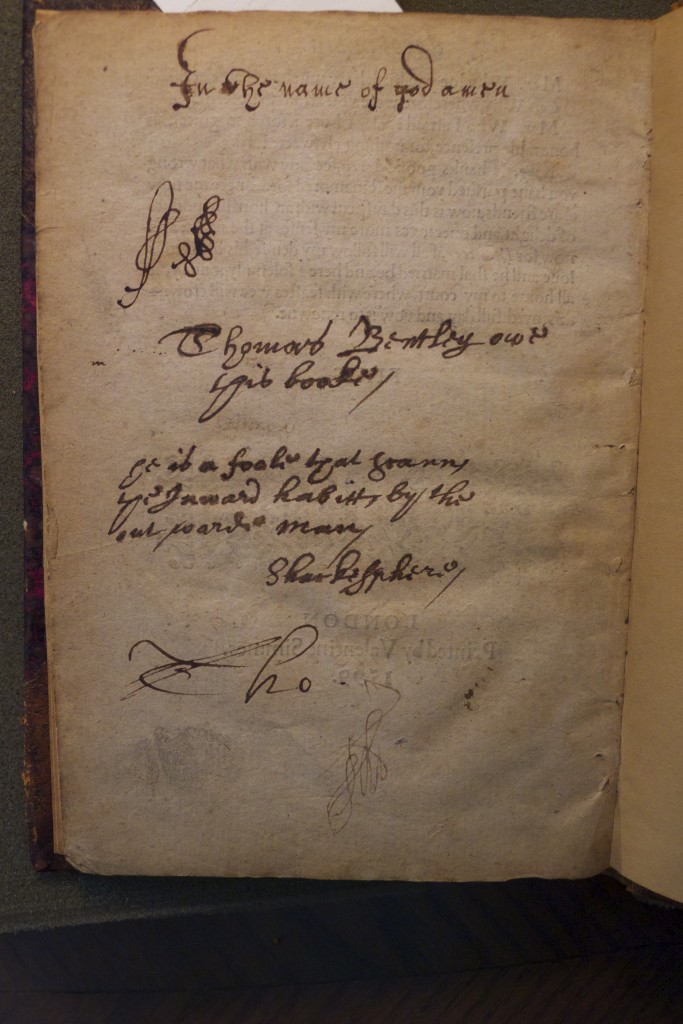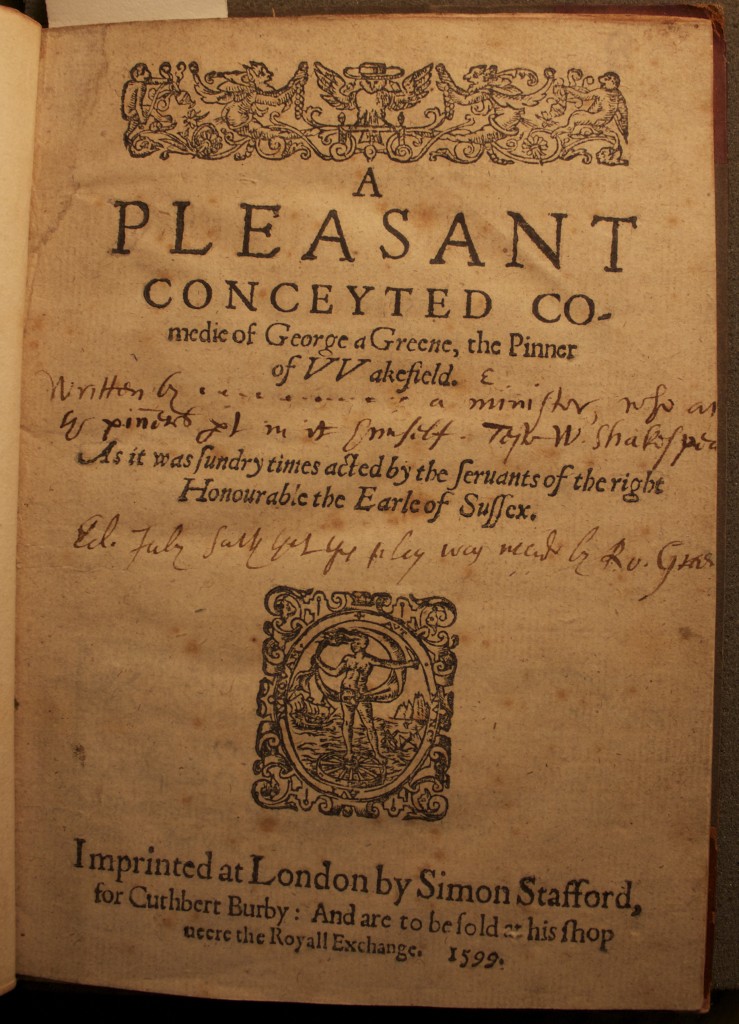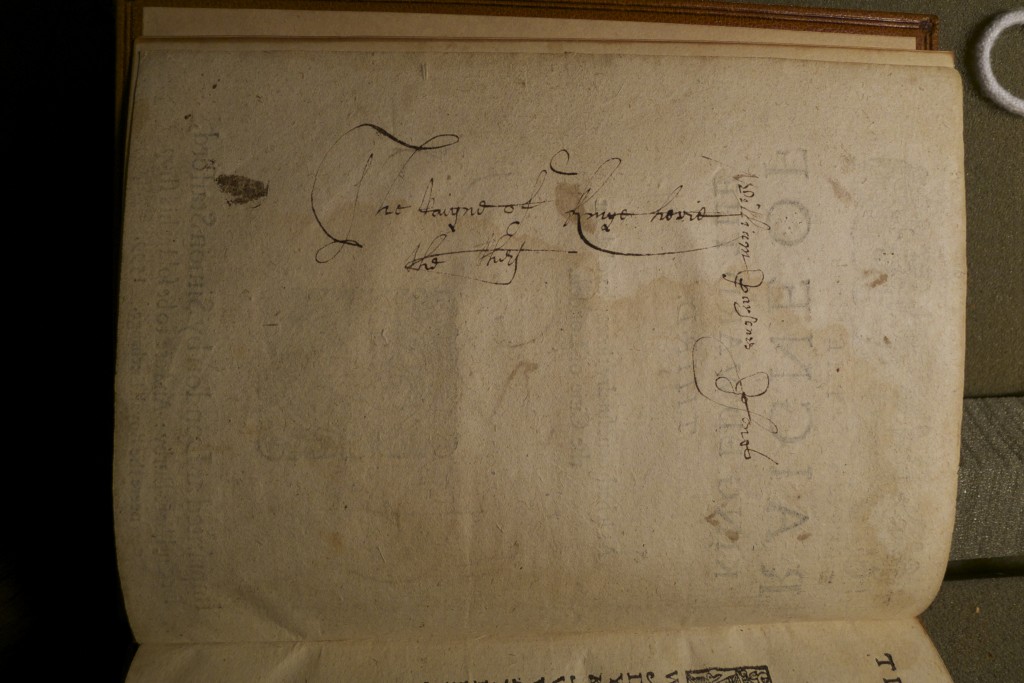Well-Read Plays V
After various disruptions and diversions, here’s the fifth and final part of my series on manuscript annotations in playbooks in the Folger Shakespeare Library.
I thought it would be fitting to finish up with a couple of Shakespearean references. The discovery of a new mention of Shakespeare is, after all, one of the great archival fantasies. None of my examples quite realize that fantasy, as far as I know — all the interesting ones have already been found and written up elsewhere. But I think these inscriptions are at least as interesting for their ordinariness as for that which makes them noteworthy: the fact that they reference Big Will. Apart from that, all these notes are much like the ones I have discussed elsewhere in this series.
Three annotations we found name Shakespeare explicitly. First, there’s this, scribbled on to the blank final page of the Folger’s first copy of Chapman’s Humorous Day’s Mirth (STC 4987, sig. H2v):
None of the inscriptions relate to Chapman’s play, which doesn’t exactly call for the pious “In the name of god amen” at the top of the page. The various doodles and fragmentary signatures are also par for the course in early books, as is the owner’s note that the book belongs to him, “Thomas Bentley.” Somewhat more unusual are the verses that follow, a slightly modified version of lines from Pericles: “he is a foole that scann / the Inward habitt / by the out warde man/ Shackesphere/”
Bentley’s Shackespherean reference is cited, in a slightly mistranscribed form, in Katherine Duncan-Jones’s Ungentle Shakespeare: Scenes from his Life (Arden, 2001), 205, and discussed in some by detail by Suzanne Gossett in “Editing Collaborative Drama,” Shakespeare Survey 59 (2006): 213-224. As Gossett points out, the annotator credits Shakespeare with lines that occur in a scene generally believed to be by his collaborator George Wilkins. Thomas Bentley either considered Pericles entirely Shakespeare’s, or, alternatively, he knew the lines out of context, not as a quotation from a particular play but from an author.
Most intriguingly, Bentley’s version differs notably from the text printed in the 1609 quarto, which has them as “Opinion’s but a foole, that makes vs scan / The outward habit, by the inward man.” And while Duncan-Jones described Bentley’s as a “garbled version” (303), they in fact make better sense than the quarto, which reverses the implicit logic of the argument: the lines should say that one can’t judge a man by his exterior, but they wind up saying, near-nonsensically, that one shouldn’t judge exterior behaviour by a man’s person(ality). Bentley’s text may more properly be said to ungarble Pericles. In doing so, our early modern annotator performs the same kind of work as later editors; most modern editions of the play render the lines as “Opinion’s a fool, that makes us scan / The outward habit for the inward man.” There’s consensus that the quarto needs emending, but exactly how the lines should be changed is obviously guesswork. Bentley seems to be as good a witness as any to what the text is actually supposed to say — we don’t know, after all, if he is quoting from a performance or misquoting from (or fixing) one of the quarto texts. If the former, his version may have greater authority than the printed playbook. Or not: whatever was spoken on stage surely had at least as loose a relationship to the authorial script as what was typeset in 1609.
Two title page annotations in the Folger mention Shakespeare. One comes from a book I already discussed in an earlier instalment, The Puritan, or The Widow of Watling Street (STC 21531 copy 2). Published as “Written by W. S.,” this volume belongs to the Shakespeare apocrypha included in the 1664 folio, although initials obviously make a less than strident claim for authorship (unlike, say, the 1605 London Prodigal with its title page attribution to “William Shakespeare”). In this instance, an early owner completed the initials, though, either following the inclusion of the play in the third folio, or anticipating the editors’ decision.
This is the sort of readerly gesture that raises more questions than it can answer: does it speak to the owner’s sense that the volume in some sense would benefit from a closer association with a particular author — or with this author in particular? Does it simply record a slightly pedantic desire to attach a name to the book, to spell out what the initials leave ambiguous? Does it express personal knowledge, conviction, or faith in what the owner had been told?
The other title page mentioning Shakespeare raises the same questions — but in this case, it explicitly answers them. This is a copy of the anonymous George a Greene (STC 12212), which records, in a hand very likely that of Sir George Buc, the future Master of the Revels, an encounter with Shakespeare — and another with the actor Edward Juby: “Written by …………. a minister,who ac the pin[n]ers p[ar]t in it himself. Teste W. Shakespea[re]” “Ed. Iuby saith that this play was made by Ro. Gree[ne].”
This inscription has produced a fair amount of scholarly debate, most of which is summed up and brought to a close in Alan Nelson’s “George Buc, William Shakespeare, and the Folger George a Greene,” Shakespeare Quarterly 49 (1998): 74-83. There is no need here to revisit the controversy, which focused on the authenticity of the annotation and the reliability of Juby’s attribution of the play to Robert Greene — read Nelson’s essay for that. But Shakespeare’s claim, as recorded by Buc, is intriguing in its own right: a play written by an unnamed minister who then played the lead himself sounds both fascinating and extremely unusual. Why would Sussex’s Men allow a non-professional actor to take such a major part?
Perhaps they didn’t. The play was old by the time it was published in 1599, and its earliest recorded performances in 1593/4 were probably a revival, so Shakespeare may simply have been reporting what he himself merely knew by hearsay. While George a Greene was indeed staged by Sussex’s Men in 1593/4 (and it is that performance that the title page records, since its text derives from a 1595 Stationers’ Register entry), there is no evidence that they were the play’s first owners. If Shakespeare’s testimony is accurate, it may thus still not tell the story of a churchman writing for and performing on the professional stage — instead, it could be evidence of a somewhat porous border between the worlds of amateur and professional acting in the early 1590s, when a play written for an academic or private audience may have been picked up and staged by a company of actors, eventually making its way into Sussex’s Men’s repertory.
In some ways more noteworthy than the presence of Shakespeare’s name on this title page is Buc’s desire to figure out who wrote the plays he bought, and to take note of their early performance history (Alan Nelson has compiled a list of other quartos with annotations by Buc). Both are relatively unusual impulses in the late sixteenth century. And beyond that remarkable desire, we might wonder about his fastidiousness in attaching authorities to his notes: these are snippets of witness statements (hence the “teste” — a use of the word we also find everywhere in early modern lawyers’ case notes whenever they compile evidence from depositions). The story about the minister is credible because Buc can attribute it to an active member of London’s theatrical community; and the same is true of the statement about Greene’s authorship. Significantly, the two mutually contradictory claims (Greene was anything but a minister) are allowed to stand side by side, both equally supported by the specific authority of their theatre-professional sources. Buc himself merely reports what he has been told, without interjecting his own credit as a theatre lover and future Master of the Revels. Although this is a private inscription in his own book, he writes as if for a wider audience: careful to spell out his evidence, leaving things he can’t resolve open, not going beyond what he can back up.
My final two examples have not been discussed elsewhere, as far as I know, and neither of them exactly mentions Shakespeare — though both might as well.
The first is a scribble from the verso of the titlepage in the Folger’s fourth copy of the second quarto of Edward III (STC 7502):
“The Raigne of Kinge herie the third” — whoever wrote this can’t have been the most attentive reader (it was likely one of the owners whose names appear on the same page: either William Parsones or Jo. Jones [if that is what the second signature says]). Edward III is now widely accepted as a Shakespearean collaboration, and from this scholarly perspective, the inscription takes on a certain ironic knowingness: by 1599, when the second quarto was printed, kings called Henry had taken on such a central role in Shakespeare’s chronicle drama that the reader’s mind almost couldn’t help but be drawn from Edward to Harry.
And lastly, there’s this, from the final page of Dekker’s 1600 Shoemaker’s Holiday (STC 6523, sig. K4v):
What are we to make of this? An early owner of the volume thought it made sense to insert, at the end of Dekker’s comedy, the titles of two other works, connected by a curly bracket: Hero and Leander and Richard the seconde — one a poem by Marlowe, the other a history play by Shakespeare; the one first published in 1598, the other the year before, in 1597. Why?
The list of possible explanations is potentially endless, and endlessly suggestive: are these the two titles this reader wanted to turn to next? Are they two volumes to be bound together with Dekker’s book? (The Folger owns copies of both texts that once formed part of the same 19th-century collection as this one, Richard Heber’s — but neither has a comparable note.) Did our reader detect some sort of similarity between Shoemaker’s Holiday and these two texts? Was the note supposed to suggest that all three works were by the same author? (All editions of Hero and Leander mention Marlowe as its author, but the first quarto of Richard II does not list Shakespeare, though the second and third quartos of 1598 do; Shoemaker’s Holiday does not name Dekker on the title page. So if our reader had common authorship in mind, he or she did not know about the later editions of Richard II.) One thing that’s certain is that a publisher wasn’t the common denominator: both Dekker’s play and Shakespeare’s were printed by Valentine Simmes, but Hero and Leander wasn’t; and Simmes owned Shoemaker’s Holiday, whereas he merely printed Shakespeare’s history for Andrew Wise. Another stationer may have been the connection, though. For all we know, the reader might have jotted down the other two titles after having picked up Dekker’s play from some bookseller’s stall — simply the names of two other volumes that were selling well, or had been recommended.
This sort of annotation remains the most fascinating kind to me. It suggests a lost connection between three books, all three still well-known and canonical, and opens up a panoply of perspectives on how these texts functioned, or could have functioned: as literary artefacts, as sources of aesthetic pleasure or pithy lines, as an author’s works, as commodities in a market for books, as material objects an owner could assemble and reassemble as she saw fit. Any of these possibilities may be inscribed in that small, straightforward, really quite humble little annotation — or it may have had an entirely different meaning or function beyond our (or my) imagination, now lost to time.
- Click to email a link to a friend (Opens in new window)
- Click to print (Opens in new window)
- Click to share on Facebook (Opens in new window)
- Click to share on Twitter (Opens in new window)
- Click to share on Tumblr (Opens in new window)
- Click to share on LinkedIn (Opens in new window)
- Click to share on Reddit (Opens in new window)
- Click to share on Pinterest (Opens in new window)
3 Responses to Well-Read Plays V
Leave a ReplyCancel reply
Recent Comments
- Premodern Performance-based Research: A Partial Bibliography – Alabama Shakespeare Project on My Trouble with Practice-as-Research
- Premodern Performance-based Research: A Partial Bibliography – Alabama Shakespeare Project on Where is the Theatre in Original Practice?
- Alex on Steven Moffat, Sherlock, and Neo-Victorian Sexism
- Tim Keenan on Where is the Theatre in Original Practice?
- Holger Syme on 1920s Berlin Theatre: Research Marginalia 1
Archives
- November 2021
- April 2020
- March 2020
- October 2019
- January 2019
- December 2018
- November 2018
- October 2018
- March 2018
- February 2018
- January 2018
- July 2017
- May 2017
- March 2017
- November 2016
- October 2016
- September 2016
- August 2016
- June 2016
- May 2016
- January 2016
- December 2015
- November 2015
- October 2015
- September 2015
- August 2015
- July 2015
- June 2015
- May 2015
- February 2015
- January 2015
- November 2014
- October 2014
- September 2014
- August 2014
- July 2014
- May 2014
- April 2014
- March 2014
- February 2014
- January 2014
- November 2013
- October 2013
- September 2013
- August 2013
- July 2013
- May 2013
- April 2013
- March 2013
- January 2013
- December 2012
- November 2012
- October 2012
- September 2012
- August 2012
- July 2012
- April 2012
- March 2012
- February 2012
- January 2012
- December 2011
- November 2011
- October 2011
- September 2011
- August 2011
- July 2011
- June 2011
- May 2011
Copyright

Holger Syme's work is licensed under a Creative Commons Attribution-NonCommercial 3.0 Unported License.Images may be reused as long as their source is properly attributed in accordance with the Creative Commons License detailed above. Many of the photos here were taken at the Folger Shakespeare Library; please consult their policy on digital images as well.







[…] the work of converting page to image. At Dispositio, Holger Schott Syme finishes up his series on marginal annotations in the Folger’s collections of early modern drama with a look at some references and non-references to Shakespeare (remember to join Paul Edmondson […]
Very interesting work, and the images look great. This has helped my understanding of readership in Jacobean England.
I love these posts. How reads the rest of the surname behind the fold on the Puritan TP? It appears that the annotation reads “ffor my worthy William T—” It also looks as if some other hand gives an alternate title.